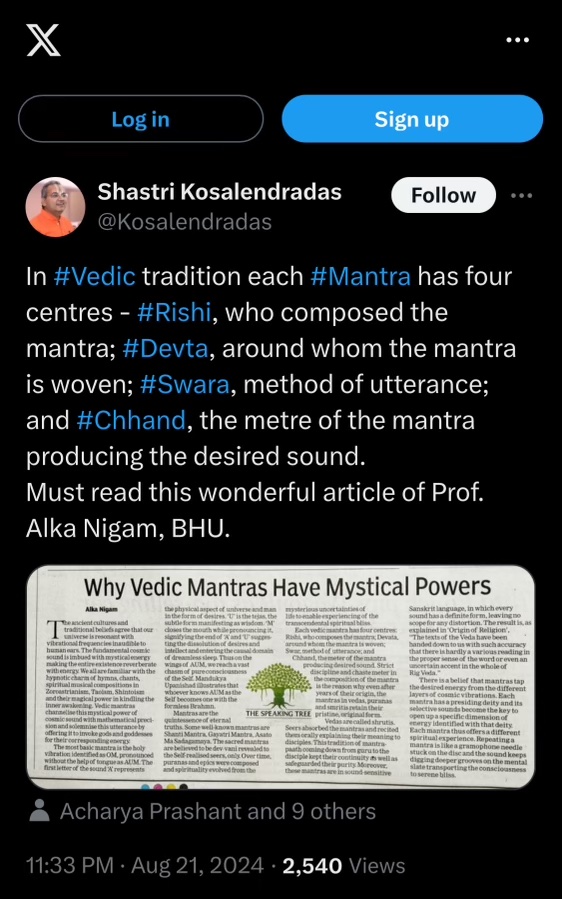Kurukshetra saw a painful, cruel battle of vested interests within a mighty, illustrious royal family causing a colossal loss of human lives. This story is illustrated in the epic Mahabharat and ever since has become a synonym of battles where jealousy, rivalry, ambitions have a full play clashing in a gory devastation. All the sides have self- righteous reasons to justify their sense of duty. But who and how to judge which side has righteousness? To resolve this, Kurukshetra is turned into a Dharmkhetra. Dharam is erroneously associated with religion. Religions acknowledge that “Truth is One” but that One Truth gets manifested differently in different religions. Only Dharma that is “the innate order of things” and worthy to be sustained has the power to lead us to that One truth. Voltaire experienced this One Truth as God . In the luminous pages of GITA Dharma emerges with this implication. Dharma is where truth is ,truth is where righteousness is, righteousness is where man is elevated above his petty self and touches the level of Godliness.
Man the supreme creation of God has been gifted with a unique ability of free -will allowing him to choose his righteous path and make his own destiny. The Bible says “Thou mayest choose for thyself, for it is given unto thee” ( Moses). Hindu Thought likewise tells to use free- will to act in the best possible way to receive goodness. The use of free-will in Western philosophical traditions of Plato, Aristotle, Augustin, Descartes and Kant is considered necessary for moral responsibility. However, it takes many births to train our will to be judicious enough to act with reason and righteous judgment. The story of Mahabharat is a beacon for mankind in their struggles of life acting as a vast mirror reflecting our lives. Here the interplay of dilemma of the instincts to do or not to do or what to do surfaces in a whirling manner. Its canvas is large and majestic as the battle was fought between the two groups of cousins- Kaurav and Pandav for the dynastic throne of Hastinapur. The characters are royal, heroic, each brilliant in his field but each fraught with his own ambitions. Tossed in a cauldron of burning emotions, war is the only choice for their unresolved issues. Duryodhan decides to refuse Pandavas their right. His another choice of free-will emerges when he chooses Lord Krishna’s Lord Krishna’s invincible army rather than Lord Himself. On the other hand Arjun’s total surrender in Krishna’s judgement makes him sail his dwindling life- boat in the right path. The wise group of Bhishm, Dronacharya and Kripacharya failed to save the honour of Draupadi, in favour of their self-assigned duty to save the honour of Hastinapur. Consequently In its heat Hastinapur turned into ashes. These wise men saw one wedge of truth ignoring the larger truth of life. Likewise it happened with a generous, skilled warrior Karna. He sided with manipulating Duryodhan justifying his act of friendship and rightly met his nemesis.
This universal law of divine judgement operates across time and space. Sophocles has gracefully woven this classic concept of human fate in his gripping tragic play ANTIGONE The under -current of both texts is the same—that a man’s excessive hubris that is “a departure from what is true, right and proper” is the cause of his ruin.
The play opens a day after two sons of Oedipus and brothers of Antigone kill each other for the throne of Thebes. The brother-in-law of Oedipus takes over the throne and accords state funeral for Eteocles. The corpse of second brother of Antigone Polyneices is left in open for the animals as a retribution for treachery. At this volcanic situation characters make different choices. Antigone sides with her wronged dead brother who was to reign jointly with his brother but was exiled. She takes it as her duty to perform sacrificial rites of her brother against the orders of Creon the king considering obedience to gods more sacred than the human law. The guard too, refuses to identify the suspect and accepts torture. Haemon caught between his love for future wife Antigone and his obdurate father urges clemency saying “ I can hear the murmurs in the dark” of what is spoken by people. The prophet makes the prophecy of the destruction of the city. Troubled by the prophecy Creon rushes to free Antigone. But he sees dead Antigone who had hanged herself and dead Haemon who had killed himself. In his grief Mother Eurydice also stabs herself. Sophocles paints his characters “as they ought to be” so makes them suffer acute pangs of sorrow and remorse and sums up his story: “All men make mistakes, but a good man yields when he knows his course is wrong and repairs the evil.”
Life is a battle- our Kurukshetra. Judiciously choosing our resources, we are free to make it a Dharmkhetra.

Leave a Reply